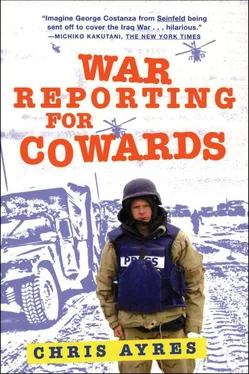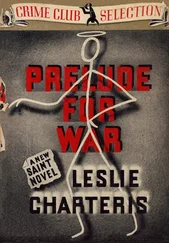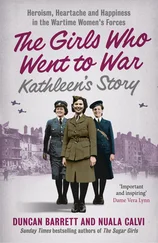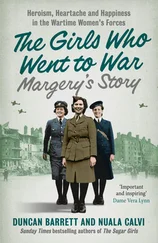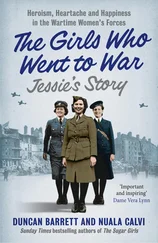Крис Айрс - War Reporting for Cowards
Здесь есть возможность читать онлайн «Крис Айрс - War Reporting for Cowards» весь текст электронной книги совершенно бесплатно (целиком полную версию без сокращений). В некоторых случаях можно слушать аудио, скачать через торрент в формате fb2 и присутствует краткое содержание. Город: New York, Год выпуска: 2005, ISBN: 2005, Издательство: Grove Press, Жанр: Биографии и Мемуары, Юмористические книги, nonf_military, на английском языке. Описание произведения, (предисловие) а так же отзывы посетителей доступны на портале библиотеки ЛибКат.
- Название:War Reporting for Cowards
- Автор:
- Издательство:Grove Press
- Жанр:
- Год:2005
- Город:New York
- ISBN:978-1-5558-4594-0
- Рейтинг книги:5 / 5. Голосов: 1
-
Избранное:Добавить в избранное
- Отзывы:
-
Ваша оценка:
- 100
- 1
- 2
- 3
- 4
- 5
War Reporting for Cowards: краткое содержание, описание и аннотация
Предлагаем к чтению аннотацию, описание, краткое содержание или предисловие (зависит от того, что написал сам автор книги «War Reporting for Cowards»). Если вы не нашли необходимую информацию о книге — напишите в комментариях, мы постараемся отыскать её.
War Reporting for Cowards — читать онлайн бесплатно полную книгу (весь текст) целиком
Ниже представлен текст книги, разбитый по страницам. Система сохранения места последней прочитанной страницы, позволяет с удобством читать онлайн бесплатно книгу «War Reporting for Cowards», без необходимости каждый раз заново искать на чём Вы остановились. Поставьте закладку, и сможете в любой момент перейти на страницу, на которой закончили чтение.
Интервал:
Закладка:
Chris Ayres

WAR REPORTING FOR COWARDS
For Lucie
The war correspondent has his stake—his life—in his own hands, and he can put it on this horse or that horse, or he can put it back in his pocket at the very last minute… Being allowed to be a coward, and not be executed for it, is his torture.
—Robert Capa, Time-Life war photographer, killed by a land mine in French Indochina, 1954PREFACE

What follows is a confession. It is also a memoir, of sorts—although I like to think it could be about anyone. Anyone, that is, who prefers the warm toilet seat to the shoveled hole in the desert; or who would rather experience the great outdoors on a comfy chair, behind tinted, reinforced glass. Feel free to flip through the excuses about character and motive, and on toward the action—the falling buildings in New York City; the biological attack; the near-misses in the Iraqi marshlands; and, of course, my final, shameful act, ninety miles south of Baghdad.
I should also mention that this is not an antiwar book. I enjoy the guilty thrill of a televised war as much as the next civilian. Bring on the gun-cam, the bomb stats, the 3D battle map, and the reporters in flakwear, standing, as they always do, on hotel balconies in distant, crumbling cities.
No, this is not an antiwar book—this is an anti-sending-me-to-war book; an I-didn’t-want-to-go book. I left Iraq dumbstruck at the sacrifice made by Rick “Buck” Rogers and his fellow United States Marines. I also left Iraq with a desire never to be trapped in a Humvee with them again.
But neither is this a pro-war book. Whether the war of March 2003 was right, or wise, is not for me to decide here. Instead, I see this as a “how-to”: a practical guide for those intrigued by the extreme tourism of conflict journalism. Most war reporters are brave, selfless types—more interested in the news story at hand than their own physical discomfort and fear. Not me. Which is why this book is dedicated to those who find themselves running in the opposite direction to the action. Yes, you know who you are: my fellow cowards out there.
C.A. London 2005.·
AL-DIWANIYAH, IRAQ
2003
1
HOW TO DEAL WITH A DEAD MEDIA REPRESENTATIVE

The day, like most of my days in Iraq, had got off to a bad start. I awoke that morning, as usual, shivering violently and aching from another night in the Humvee. Waking up, of course, shouldn’t be a difficult or traumatic process. For the first twenty-seven years of my life, I had done it every day without even thinking. Open eyes. Yawn. Scratch balls. Look up at ceiling. Climb out of bed. Waking up in a Humvee, however, on the front lines of an invasion, is different. The first thing you notice is the contortion necessary to sleep inside the vehicle: the head dangles inches from the bare metal floor; the right leg is to be found somewhere behind the left ear. The spine feels as though it has been splintered like a cocktail stick. If the war doesn’t kill you, sleeping in the Humvee might. Look what happened to David Bloom, the newsman from NBC: dead at thirty-nine from “deep vein thrombosis”—aka Economy Class Syndrome—after spending one too many nights folded inside his “Bloom-mobile.”
Then comes the mental replay of the night before—the hollers of “Lightning! Lightning!”; the absurd 3:00 A.M. fumble for the gas mask, Wellington boots, and rubber gloves; the casualty reports over the radio. And then you remember the almost hallucinatory dreams: corny, sepia-tinted images of parents, aunts, uncles, and grandparents. With that comes a gutful of guilt—at what you’re doing to the little boy they spent years nurturing. And, of course, what you’re doing to them , as they try to hold down undigested food every time they switch on the television. Oh yes, the battlefield dreams are best forgotten. Quickly.
From the outside, the gap-toothed Humvee looked as though it belonged on Sunset Strip: an oversized pleasure wagon with a camouflage paint gimmick and room in the back for a hot tub and PlayStation. Inside, however, the vehicle was jammed with radio equipment, ration packs, and a large circular footplate for the machine gunner, an earnest and aging first sergeant called Frank Hustler, who could have been a P.E. teacher in a different life. His desert boots danced to the rhythm of his paranoia somewhere next to my right hip. The gun on the roof was a .50-caliber—the kind they used in B-17 bombers during World War II. A single shot to the abdomen would rip you in half like a Christmas cracker.
In front of me sat the young Irish-American driver, “Fightin Dan” Murphy, and the half-Trinidadian captain of our unit, Rick Rogers, known to everyone but his mother as “Buck.” Directly behind my head were two filthy olive drab Iraqi Republican Guard uniforms and a sloppily maintained Kalashnikov, all confiscated during a violent, terrifying house raid outside al-Nasiriyah. The Humvee’s narrow seats, stuffed with cheap foam and covered with ripped, muddy canvas, were an afterthought. After two weeks, my buttocks felt badly bruised.
At one point I could have sworn they had started to bleed.
“Holy shit , look at the size of this scorpion!”
This was Murphy, a few nights earlier. He had just discovered the downside to sleeping on the desert floor: It glistened and squirmed with an encyclopedia’s worth of creepy-crawlies. The Marine, who was barely old enough to buy alcohol and spoke with a profane Irish drawl, stared with incredulity at the creature that had just disturbed what passed for sleep in an Iraqi kill zone.
He jabbed at the grumpy arachnid with his rifle.
“Cap’n, did you see that? That mother fucker could have crawled into my sleeping bag. It coulda crawled up my ass!”
Buck was lying on the Humvee’s hood, staring at the gleaming constellation above. The distant thuds of bombs being dropped on Republican Guard positions echoed through the infinity of mud and sand.
“Sleep on top of the vehicle, Murphy,” he said, impatiently. “There ain’t nothin’ gonna crawl up your ass up there.”
“Where’s the media dude?” asked Murphy.
“In the back. First sarge is in the front. Sleep on the roof.”
From the back of the Humvee, I could hear tobacco being spat, a sleeping bag being unzipped, and a short, tightly wound Marine scaling the side of the Humvee. With a clatter, Murphy pulled himself onto the Humvee’s roof. Somewhere, another bomb went off and more Iraqis died, horribly.
“Some fuckin’ stars,” said Murphy.
“Like being on vacation,” muttered Buck.
In front of me, I heard Hustler’s chemical suit rustle. “Personally, I’m thinkin’ of buying myself an Iraqi retirement home,” he declared. “Either that, or I’m gonna open the first goddamn Starbucks in Baghdad.”
There was, of course, another downside to sleeping on the ground: The risk of making an unlucky roll onto a land mine—probably intended for the Iranians, back when the Americans were on the Iraqis’ side. Getting my legs blown off, I thought, would really interfere with my morning schedule. And it would ruin the goose-down sleeping bag I had bought in Beverly Hills—in the days I was supposed to be writing about celebrity parties and film premieres.
Читать дальшеИнтервал:
Закладка:
Похожие книги на «War Reporting for Cowards»
Представляем Вашему вниманию похожие книги на «War Reporting for Cowards» списком для выбора. Мы отобрали схожую по названию и смыслу литературу в надежде предоставить читателям больше вариантов отыскать новые, интересные, ещё непрочитанные произведения.
Обсуждение, отзывы о книге «War Reporting for Cowards» и просто собственные мнения читателей. Оставьте ваши комментарии, напишите, что Вы думаете о произведении, его смысле или главных героях. Укажите что конкретно понравилось, а что нет, и почему Вы так считаете.
